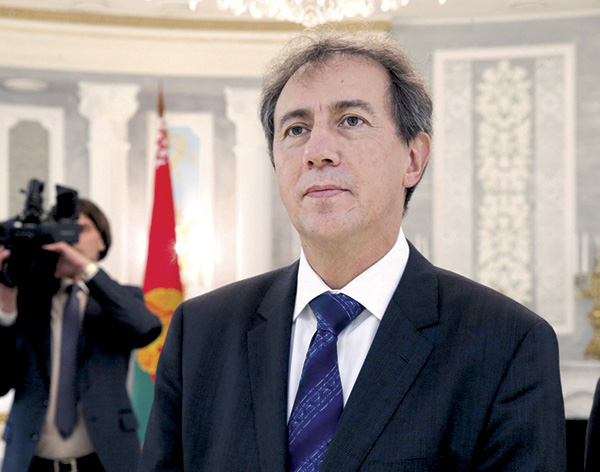World Bank ready to support major and intensive mutual co-operation
This conclusion can be made following Minsk’s meeting of Alexander Lukashenko with Cyril Muller, the World Bank Vice President for Europe and Central Asia.

Cyril Muller
“We should prepare a roadmap for future co-operation by the end of this year. We’ll deliver on time, and it will rival any previous roadmap,” Mr. Lukashenko declared at the beginning of the meeting.
The President thanked the World Bank for its existing level of collaboration, saying, “In the most difficult times, the World Bank has been faithful to its ethos. We’ve always managed to find common interests.”
In particular, Mr. Lukashenko mentioned the World Bank’s assistance in financing such infrastructure projects as the construction and renovation of roads, water treatment, and household waste processing and the minimisation of the impact of the Chernobyl disaster. “You’ve helped us upgrade the forestry industry, the modernisation of which began with your assistance. We’ve made huge progress in import substitution in the forestry industry and are working in compliance with the highest standards,” asserted the President.
Mr. Lukashenko emphasises that open and significant experience of co-operation with the World Bank has taught us much, and that the recent meeting will help advance our relations.
Mr. Muller noted that it has been a great honour for the World Bank to provide assistance to Belarus in recent years. He thanked the Belarusian Head of State for his praise of joint programmes, saying, “We’ve achieved significant positive results, including accelerated and expanded joint programmes. We’re going to move forward.”
 “We’re working on a strategy for the future, and I’ll be grateful to you for your outlining of key areas of focus for us,” added the Vice President of the World Bank.
“We’re working on a strategy for the future, and I’ll be grateful to you for your outlining of key areas of focus for us,” added the Vice President of the World Bank.
The meeting tackled concrete avenues of interaction and important projects, with both sides noting their willingness to do their best to advance co-operation to a new level. In particular, the World Bank is ready to help Belarus raise the competitiveness of its products, via the diversification and modernisation of production facilities. Transport infrastructure is to become more technological and a related innovative project is currently underway. Another promising field of collaboration is the support of small and medium-sized businesses, helping Belarusian manufacturers penetrate new markets.
On both sides, we’re ready to continue efficient co-operation across such traditional areas as power engineering, education, healthcare, and environmental protection. The recent meeting also focused on the development of human potential, under just principles, for Belarus and the World Bank. The economy should work for the benefit of our people.
The World Bank is currently implementing a number of projects, estimated to be worth almost $1bn, including in such areas as the development of water supply and waste disposal systems, the enhancement of energy efficiency, the improvement and modernisation of roads, and the development of the forestry sector. The modernisation of the education system and that of state finance management are also under focus. Since 1992, the World Bank’s investments have amounted to about $1.5bn.
Belarus has been a member of the World Bank since 1992. As of May 23rd, 2016, Belarus has accounted for 0.21 percent of the total number of voices and 0.19 percent of the total amount of World Bank shares.
By Vladimir Khromov











